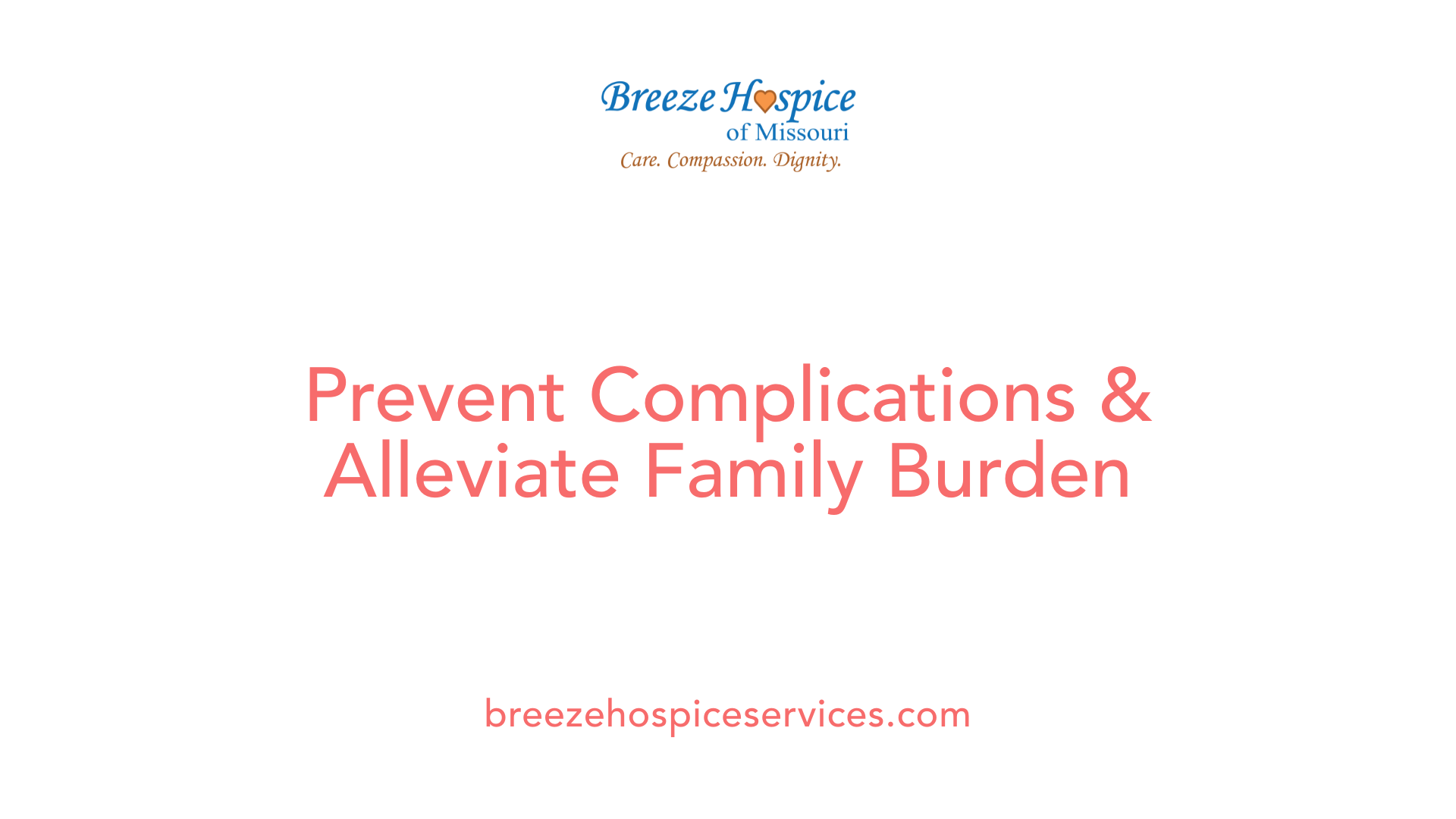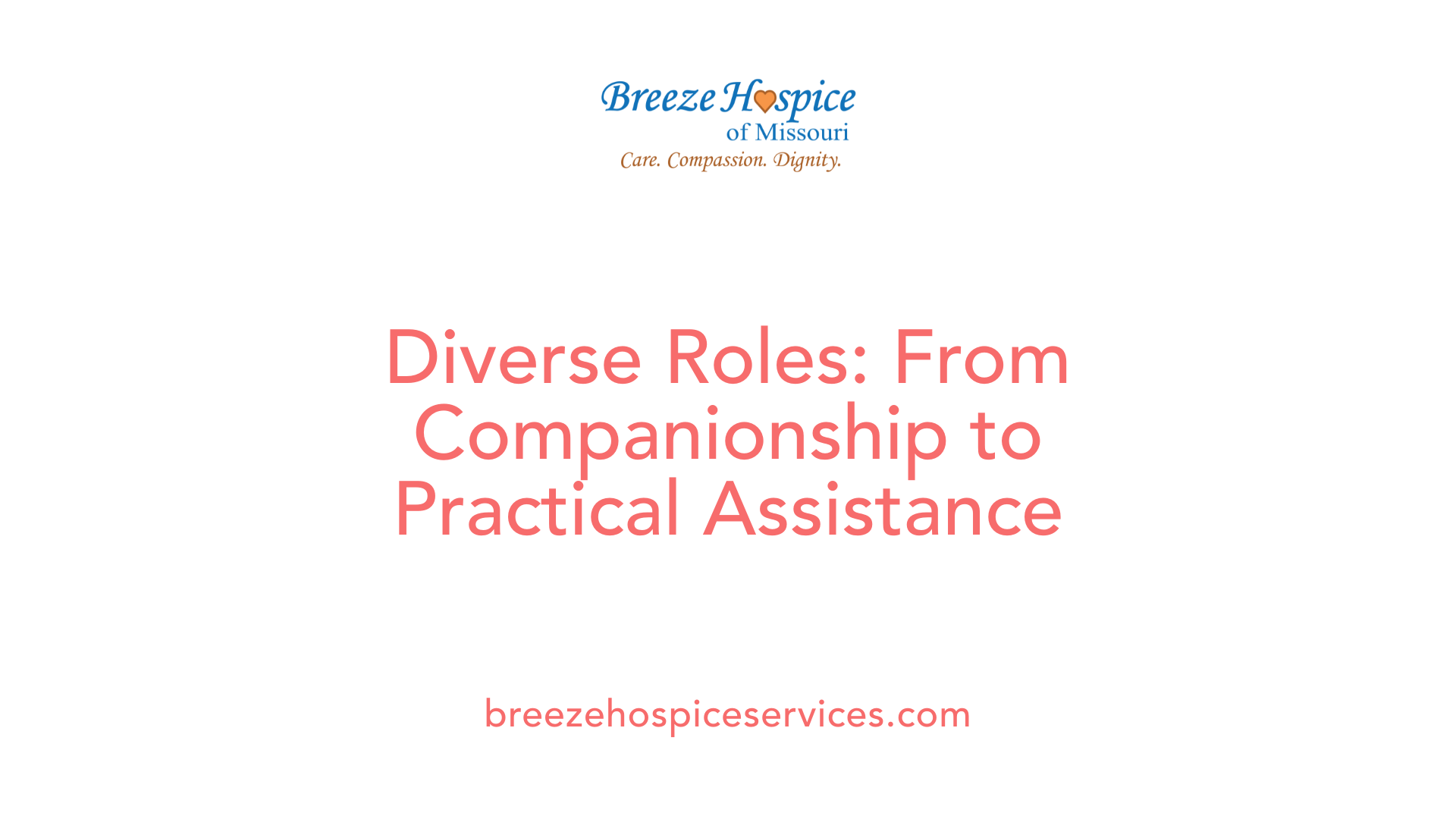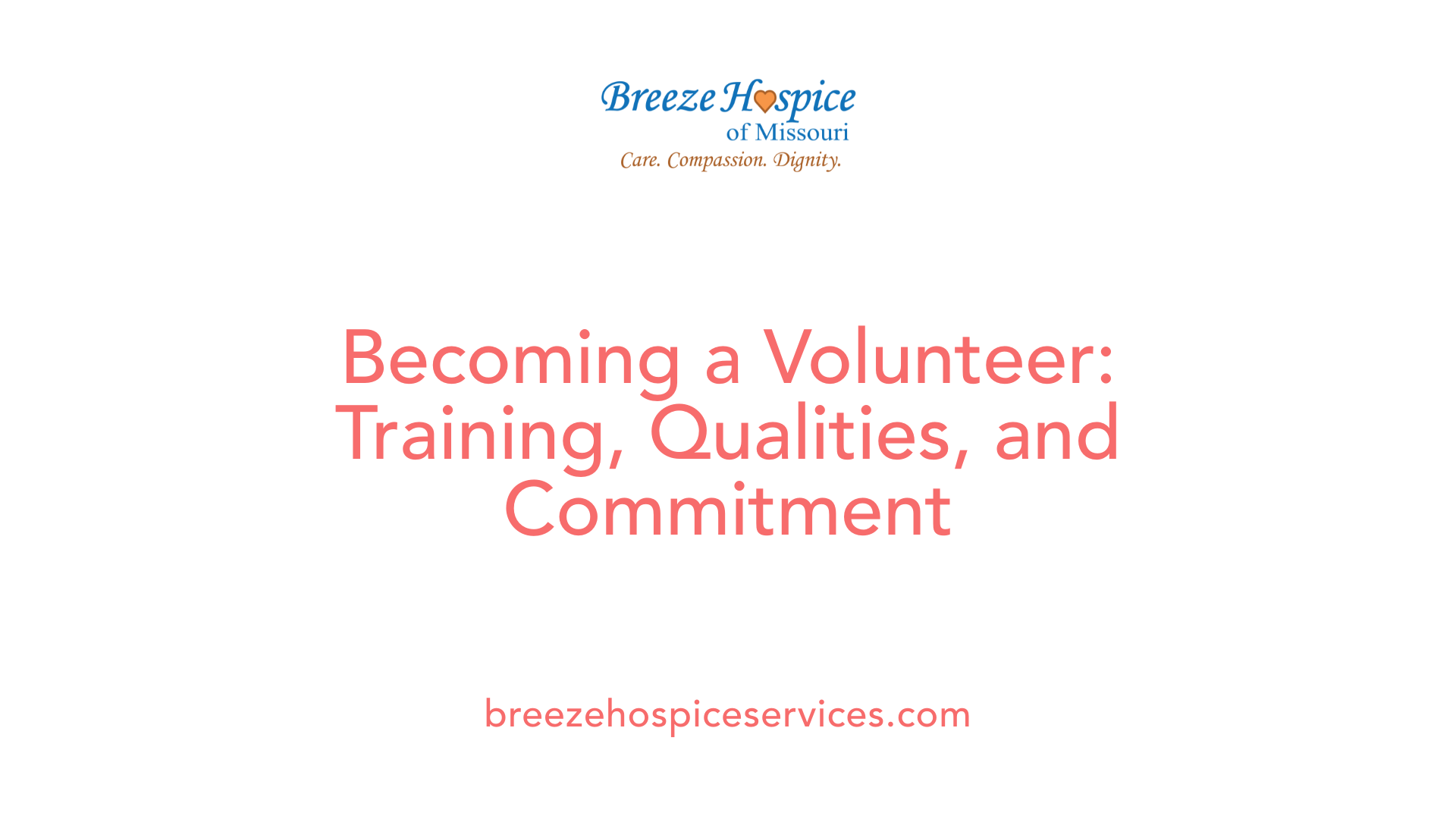The Role of Hospice Volunteers in Providing Daily Living Support
July 21, 2025
Compassionate Care at the End of Life: Inside the Vital Role of Hospice Volunteers

Understanding the Heart of Hospice Support
Hospice volunteers are the compassionate backbone of end-of-life care, providing essential support that addresses patients' physical, emotional, and social needs. Their role extends beyond medical treatment, fostering human connection, dignity, and comfort during a deeply personal and vulnerable time. This article explores the multifaceted contributions of hospice volunteers, highlighting their roles in daily living support, the importance of their engagement, necessary training, and the profound impact they have on patients and families.
The Significance of Daily Living Support in Hospice Settings

What is the significance of daily living support in hospice settings?
Support with daily activities is a cornerstone of hospice care, playing a vital role in safeguarding patients’ dignity and comfort as they approach life's final stages. Assistance with activities of daily living (ADLs)—such as personal grooming, bathing, dressing, mobility, and feeding—serves not just to meet physical needs but also to foster a sense of independence and self-respect.
Hospice volunteers and staff are trained to provide compassionate help with these tasks, ensuring patients feel valued and cared for. This support allows patients to focus on personal interactions and meaningful experiences, rather than physical discomfort or the burden of self-care.
Moreover, addressing ADLs helps prevent complications like infections or injuries, especially for those with limited mobility or chronic illnesses. Volunteers may assist by helping patients get up and move safely or by supporting their hygiene routines, which are essential for comfort and health.
Alleviating the burden on family caregivers is also crucial. Family members can experience emotional stress and physical exhaustion from constant caregiving duties. Hospice helpers step in to fill this gap, offering respite and enabling families to rest or tend to their own emotional needs.
Monitoring patient well-being during these activities ensures that any changes in physical or psychological conditions are promptly noted. This vigilance supports early intervention and tailored care, improving the overall quality of life.
In summary, daily living support is more than practical assistance; it is a compassionate effort to preserve dignity, foster emotional wellbeing, and ensure safety. Such attentive care helps patients enjoy their remaining days with comfort, respect, and a sense of normalcy, which is at the heart of hospice philosophy.
Roles and Support Provided by Hospice Volunteers
 Hospice volunteers play a vital role in enhancing the quality of life for patients nearing the end of their lives. Their support spans a wide range of activities designed to provide comfort, companionship, and practical assistance. One of their primary functions is offering emotional support and company, which involves engaging patients in conversations, reading aloud, playing music, or sharing stories. These interactions help alleviate feelings of loneliness and foster dignity and joy in patients’ final days.
Hospice volunteers play a vital role in enhancing the quality of life for patients nearing the end of their lives. Their support spans a wide range of activities designed to provide comfort, companionship, and practical assistance. One of their primary functions is offering emotional support and company, which involves engaging patients in conversations, reading aloud, playing music, or sharing stories. These interactions help alleviate feelings of loneliness and foster dignity and joy in patients’ final days.
In addition to emotional engagement, volunteers assist with daily tasks that can be challenging for patients. They help with personal grooming, light housekeeping, preparing meals, and running errands such as grocery shopping or pharmacy pickups. This practical support relieves the physical and emotional burden on families and caregivers, giving them much-needed respite.
Supporting family caregivers is another critical aspect of volunteer work. By providing companionship to patients and relief for caregivers, volunteers allow families to rest, attend to their own needs, or handle other responsibilities. Post-bereavement, volunteers often stay connected by offering grief counseling, support groups, or follow-up calls, helping families cope with loss.
Some volunteers take part in specialized activities that create memorable and comforting experiences. Pet therapy volunteers bring trained therapy dogs to visit patients, providing emotional uplift and tactile comfort. Vigil volunteers remain at the bedside during a patient’s final hours, offering a calming presence, playing music, or simply holding hands to ensure no one faces death alone.
Hospice volunteer roles are diverse and tailored to meet specific needs. These include direct patient interaction, administrative support, community outreach, and specialized services like veteran support or artistic therapy. By fulfilling these various roles, hospice volunteers significantly contribute to holistic palliative care, making each patient’s end-of-life journey respectful, meaningful, and filled with human connection.
Training and Qualifications for Hospice Volunteers

What training and qualifications are necessary to become a hospice volunteer?
Becoming a hospice volunteer involves completing a structured application and participating in comprehensive training programs. This training typically covers the philosophy of hospice care, effective communication, emotional support techniques, cultural sensitivity, and safety protocols. Volunteers are also educated about issues faced by patients at the end of life, including physical, emotional, and spiritual needs.
Most programs require candidates to pass background checks and provide health clearances, including immunizations, to ensure safety for both patients and staff. Reliable transportation is usually necessary, as volunteers often visit patients at their homes or care facilities.
Candidates generally need to be over 18 or 21, although some organizations accept high school students who demonstrate maturity and compassion. Good listening skills, emotional resilience, and the ability to maintain professional boundaries are essential qualities. Ongoing training sessions are provided regularly to update volunteers on best practices, grief management, and safety.
The commitment often involves a minimum of one year of service and a certain number of hours per month, depending on the organization. This consistent preparation helps volunteers serve effectively and with sensitivity.
Why are hospice volunteers important in end-of-life care?
Hospice volunteers play a crucial role in providing emotional comfort, companionship, and practical support to patients nearing the end of their lives. Their presence can significantly reduce feelings of loneliness, anxiety, and sadness, especially for those without close family nearby.
By engaging patients in conversation, sharing hobbies, or simply offering a listening ear, volunteers contribute to a better quality of life during difficult times. They also support families, giving caregivers respite and helping with daily activities, which relieves emotional and physical stress.
Through their dedicated service, volunteers help create a more peaceful, dignified experience for patients and their loved ones. They are vital in fostering a humane, compassionate environment that emphasizes comfort and connection beyond medical treatment.
| Aspect | Details | Additional Notes |
|---|---|---|
| Training Topics | Hospice philosophy, communication, grief, safety, cultural issues | Continuous education to adapt to patient needs |
| Volunteer Qualities | Compassion, reliability, good listening, emotional resilience | Important for handling end-of-life situations |
| Eligibility Requirements | Age (18+ or 21+), background checks, health clearances, transportation | Some programs accept teenagers with mature attitude |
| Role Expectations | Regular hours, ongoing support, respectful boundaries | Essential for effective caregiving |
With such training and dedication, hospice volunteers are irreplaceable members of the team, ensuring that patients receive compassionate, respectful care tailored to their unique needs.
Regulations, Guidelines, and Becoming a Volunteer
What regulations and guidelines govern hospice volunteer activities?
Hospice volunteer activities are primarily governed by federal and state regulations designed to ensure safety, quality, and professionalism. These regulations set standards for screening procedures, training programs, supervision, and documentation. Volunteers must undergo orientation and periodic training tailored to their roles, with competency assessments to ensure preparedness.
Legal requirements include mandatory background checks and health screenings, such as immunizations against contagious diseases, to prevent health risks to patients. While federal regulations prohibit volunteers from performing medical tasks like administering medications, they emphasize the importance of maintaining professional boundaries.
Organizations also follow guidelines from the National Hospice and Palliative Care Organization (NHPCO) and adhere to Medicare Conditions of Participation, which mandate that at least 5% of patient care hours be contributed by volunteers. These regulations help integrate volunteers into care teams effectively, supporting both safety and quality standards.
How can individuals become involved as hospice volunteers?
Getting involved as a hospice volunteer typically begins with reaching out to a local hospice organization. Interested individuals need to complete an application form and pass background checks. Following this, they attend comprehensive training sessions, usually spanning 16 to 30 hours, covering topics such as hospice philosophy, effective communication, end-of-life issues, confidentiality, and grief support.
Many hospices have specific eligibility requirements, including minimum age (often 18 or 21), possession of a valid driver’s license, and up-to-date immunizations. Volunteers can choose from various roles, including companionship, respite care, administrative support, or bereavement activities, depending on their interests, skills, and availability.
Once trained, volunteers work collaboratively with staff, providing flexible, personalized support to enhance patient comfort and emotional well-being.
What challenges do hospice volunteers face, and how do they address them?
Volunteering in hospice can be emotionally demanding. Volunteers often witness suffering and confront the realities of death, which can cause emotional strain and grief. To manage these challenges, organizations provide ongoing training in emotional resilience, communication, and grief management.
Another challenge involves feeling underappreciated or underutilized. Addressing this, hospices foster regular supervision, recognition programs, and opportunities for feedback, helping volunteers feel valued and engaged.
Diversity and outreach also present hurdles—organizing efforts to recruit volunteers from varied backgrounds can improve cultural sensitivity and accessibility. Most organizations support volunteers with resources like counseling, peer support groups, and educational updates.
Despite these hurdles, hospice volunteers remain vital. Their dedication and compassion significantly contribute to the holistic care environment, enriching the end-of-life experience for patients and their families.
The Impact and Personal Growth through Volunteering
Why are hospice volunteers important in end-of-life care?
Hospice volunteers play a vital role in enriching the final days of patients facing serious illnesses. Their presence offers companionship, emotional reassurance, and comfort, helping patients feel less lonely and more at peace. Volunteers often engage in activities such as talking, reading, playing music, or simply sitting quietly, which can significantly elevate a patient’s emotional well-being.
Beyond supporting patients directly, volunteers assist their families by providing relief through errands, personal care, and emotional support, thus easing the overall caregiving burden. Their contributions serve to improve quality of life, making the experience of dying more dignified and meaningful.
Volunteers undergo specialized training that equips them with effective communication, empathy, and boundary-setting skills. These experiences not only benefit patients but also foster personal development in volunteers, enabling them to handle grief and emotional challenges better.
In essence, hospice volunteers are indispensable. They help create a supportive environment where patients feel valued and cared for, their presence making a profound difference during a delicate and vulnerable time.
Honoring the Human Connection in End-of-Life Care
Hospice volunteers embody the spirit of compassion, compassion, and kindness that is central to end-of-life care. Their diverse roles—from direct patient interaction and practical assistance to administrative support—enhance the quality of life for patients and provide indispensable relief to families and care teams. Governed by strict regulations and dedicated training protocols, volunteers are prepared to navigate the emotional complexities of hospice care with professionalism and empathy. Their presence alleviates loneliness, fosters dignity, and helps create meaningful moments during life’s final chapter. Engaging in hospice volunteering not only profoundly benefits patients and their loved ones but also offers volunteers personal growth, purpose, and a deeper appreciation for life and human connection. As the backbone of holistic hospice care, volunteers’ dedication underscores the essential role of human kindness in caring for others at life’s most vulnerable moments.
References
- What Does a Hospice Volunteer Do? Bringing Comfort and Help - 3HC
- Volunteering with Hospice - CaringInfo
- The Role of Hospice Volunteers in Providing Comfort to Seniors
- Why Being a Hospice Volunteer is Rewarding - By the Bay Health
- Volunteers are a Vital Part of the Hospice Care Team
- What Role Do Volunteers Play in Hospice Care?
- What Do Hospice Volunteers Do? | 4 Ways They Make an Impact
- Importance of Hospice Volunteers | Understanding the 5% Rule



































































































